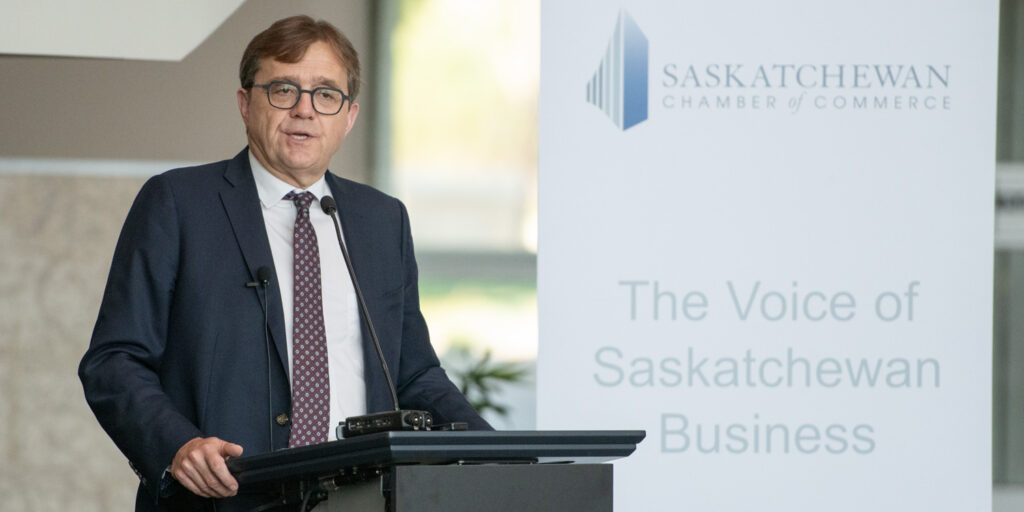Brian Zinchuk is editor and owner of Pipeline Online

Federal Minister of Natural Resources Jonathan Wilkinson, in Regina, on June 28. Photo by Brian Zinchuk
CARROT RIVER – As part of a suite of funding announcements on June 28, Jonathan Wilkinson, Minister of Natural Resources, announced a $10 million contribution to BioLesna Carbon Technologies LP. That’s a joint venture between BC Biocarbon and Dunkley Lumber Ltd. The project is a new biorefinery in Carrot River, Saskatchewan. The contribution comes through the Investments in Forest Industry Transformation (IFIT) program, which aims to support Canada’s forest sector resilience through targeted investments in advanced technologies and products.
The Carrot River Biorefinery will utilize BC Biocarbon’s proprietary processes to convert residual biomass from forest operations to produce four initial products: biochar, bio-oil, wood vinegar and pyrolysis gas. These materials can then be further refined into value-added products such as soil additives, filtration media, electrodes and specialty chemicals. Based on the project’s ability to substitute products derived from non-renewable sources and the carbon sequestration capacity of the biochar produced, carbon removal credits may also be generated.
Through this project, BioLesna Carbon Technologies LP will create local employment for the Carrot River community and surrounding areas, said Natural Resources Canada in a press release. The Carrot River Biorefinery will also contribute to increased scale-up production and monetization of low-grade feedstock, as well as improve the utilization of forestry-based residuals and increase the diversity of forest products.
“The Investments in Forest Industry Transformation program facilitates the adoption of transformative technologies and products by bridging the gap between development and commercialization. The IFIT program aims to create a more competitive and resilient forest sector with a focus on low-carbon projects that result in new or diversified revenue streams,” the release said. “Through investments just like this, Canada is supporting and diversifying our forest sector in the implementation of more sustainable solutions and technologies that will increase competitiveness, drive growth, lower emissions and grow the economy.”
Wilkinson said in a release, “Canada’s forest sector supports livelihoods and drives economic growth in communities across the country. Once operational, this biorefinery in Carrot River will allow residual materials to be further utilized as value-added products, thereby reducing waste and increasing sustainability. Smart investments like this one will ensure the diversification of the sector, providing new economic opportunities for local communities and sustainable jobs for workers.”
Peter Popplewell, CEO, BC Biocarbon, said, “At BC Biocarbon, we are thrilled to have earned the confidence and financial support of NRCan to build this first of its kind facility in Canada using Canadian technology. By supporting BioLesna’s project, NRCan has demonstrated their commitment not only to the continued technological evolution of the Canadian forest industry, but also to the importance of continued Canadian leadership in the development and deployment of leading-edge technologies that perform carbon removal and sequestration on an industrial scale.”
Kris Hayman, VP Eastern Operations, Dunkley Lumber, “The conversion of residual biomass into innovative products like biochar is a great step forward in the evolution of Canada’s wood products industry. We’re proud to be part of this Canadian-made solution to a decades old challenge and look forward to seeing many similar installations over the coming years.”
